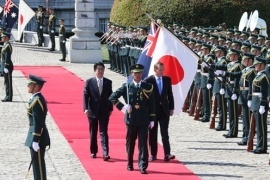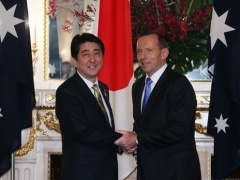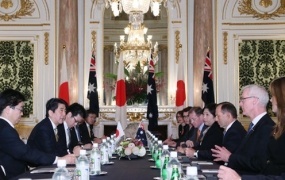Oceania
Visit to Japan of The Hon Tony Abbott, Prime Minister of the Commonwealth of Australia(Overview)
April 7, 2014



From Saturday, April 5, to Tuesday, April 8, The Hon Tony Abbott, Prime Minister of the Commonwealth of Australia paid an official visit to Japan. An overview of his visit is as follows:
1. Main Events
April 5 Arrived in Japan
April 6 Luncheon meeting with concerned parties from both Japan and Australia and visited Japanese enterprises.
April 7 Welcome ceremony and a ceremony to disclose the “New Colombo Plan (a plan for dispatching Australian students for overseas education)”. Luncheon meeting with persons from Japanese enterprises, audience with His Majesty the Emperor of Japan, participation in the special meeting of the “National Security Council (meeting of four ministers)”, Japan-Australia summit meeting, joint press conference, banquet hosted by Prime Minister Shinzo Abe.
April 8 Left Japan
2. Summit Meeting, etc.
Confirmed to elevate the “strategic partnership” between Japan and Australia to a new special relationship and released the “Joint Press Release”.
Confirmed agreement in principle on Japan-Australia Economic Partnership Agreement (EPA)
Specifically, both parties agreed on (A) promotion to ensure competitiveness of Japanese enterprises in the Australian market by, for example, immediate abolishment of tariffs of approximately 75% of the export value of automobiles, one of the products of interest in Japan, while the remaining amount of tariffs will also be abolished in three years, (B) providing a chapter dedicated for food supply in the agreement for the first time ever and at the same time providing an article for energy and mineral resources to set stipulations for ensuring stable supply of food and energy and mineral resources, and (C) in terms of beef, one of Australia’s products of interest, gradual reduction of tariffs in years while introducing a new safeguard for setting the tariff rate back to the former one when the amount of import reaches a certain quantity.
Further strengthening of cooperation in the field of security
A. Prime Minister Abe expressed his gratitude for the support from Australia on Japan’s “Proactive Contribution to Peace” and stated that he would like to further strengthen security cooperation between Japan and Australia and Prime Minister Abbott shared his view with Prime Minister Abe.
B. Specifically, (a) both parties decided to begin negotiations for an agreement on a framework for cooperation in the field of defense equipment and technology, and (b) confirmed that interoperability between defense organizations of the two countries will be improved and practical cooperation including joint exercises will be further enhanced.
Support for the “New Colombo Plan”
A. Prime Minister Abbott gave an explanation on the “New Colombo Plan” for dispatching Australian students overseas and proposed that the most excellent student of the program will be named a “Kishi Fellow.”
B. Prime Minister Abe highly evaluated a fact that Prime Minister Abbott selected Japan as one of the first countries for implementation of the plan and confirmed launching of “Japan-Australia Friends of the New Colombo Plan” by the government authorities of the two countries for smooth acceptance of the students (see attachment).
Regional/international situations
A. Prime Minister Abe proposed cooperation in the G20 Brisbane Summit and the Seventh Pacific Islands Leaders Meeting to be held in Iwaki City next year and further strengthening of Japan’s roles in the Pacific Islands Forum (PIF), an international organization in the Pacific region. Prime Minister Abbott stated that he would like to advance cooperation with Japan in this field.
B. Both leaders discussed on a wide range of regional and international challenges including the North Korean situation, particularly the abductions issue as well as the nuclear and missiles issues, Syria, the United Nations Security Council reform, and non-proliferation and disarmament, and the two leaders shared their recognitions on such issues.
C. Both leaders confirmed the importance of recognition that international disputes and issues should not be solved by force but should be solved peacefully according to the international laws.
Whaling
In the series of conversations during Prime Minister Abbott’s stay in Japan, Prime Minister Abe mentioned the difficult conditions in Japan following the court decision on the whaling case at the International Court of Justice (ICJ) and the two leaders shared their views that they would make efforts so that this issue would not influence the overall bilateral relations.


 (73KB)
(73KB)